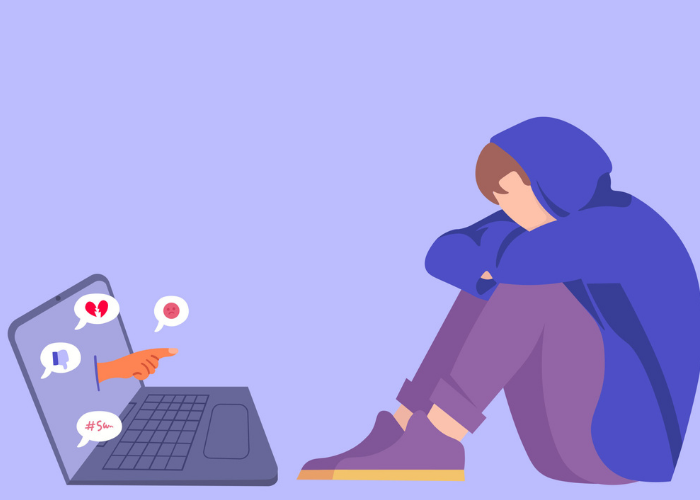ONLINE HARASSMENT AND CYBERBULLYING: A LEGAL PERSPECTIVE


Technology has become an important part of our lives. With this, cyber law has also become an indispensable. Cybercriminals have started using different modus operandi to do online crimes and frauds. The cyber threats have continuously risen and it is important to have a legal partner as your aide. At Candour legal, we are proud to be one of the leading law firms of Ahmedabad, India, specializing in the field of cyber law. Our experienced team is Led by Mr. Manasvi Thapar, one of the country’s foremost cyber law experts. Our team has the necessary skills and knowledge and experience to handle critical and complex matters related to cyber laws, online crime and data privacy.
The Internet is vital for our everyday life in the 21st century. The right to the Internet also comes under the ambit of the right to life(Article 21). The world came to a standstill when the pandemic hit the planet, and we were quarantined. The only thing that kept humans sane and connected was the Internet. So yes, the Internet is essential now; it no longer comes under the category of luxury. It offered endless opportunities to creators worldwide to go to an online platform and showcase their talent; it made the vaccination process more manageable and smoother, and a populous country like India developed the Arogya Setu App for COVID-19 vaccination. In this blog, we will understand everything from cyberbullying and ways to prevent cyberbullying.
It facilitates everything in our lives today, from Education and health, staying connected to friends, and running businesses to something as simple as ordering groceries from grocery apps. Our lives have changed for the better, but this is us looking at the Internet with our rosy-tinted glasses; where there is no drawback to the Internet, but in reality, everything has its shortcomings, and the Internet is no exception to it. The Internet, too, has a negative side to it, and Cyberbullying and Online Harassment are two of them. These particular types of cyber aggression can have significant adverse psychological and emotional effects on people. Every social media platform, including messaging apps and social media sites, appears to be vulnerable to the threat of harassment and cyberbullying.
Defining Online Harassment and Cyberbullying:
Online harassment can be defined as repeated, unsolicited, hostile behaviour by a person through cyberspace with the intent to terrify, intimidate, humiliate, threaten, harass or stalk someone. Any harassment caused through electronic media is considered to have a similar impact as the traditional offence of harassment. It can be done through various means of Information Technology.
A basic understanding of the term “Bullying” is when people repeatedly and intentionally use words or actions against someone or a group of people to cause distress and risk to their well-being. United Nations Children’s Fund (UNICEF) defines cyberbullying as bullying with the use of digital technologies. It can occur on social media, messaging, gaming, and mobile phones. It is a re]peated behaviour aimed at scaring, angering, or shaming those who are targeted. It can involve sending threats that cause embarrassment or humiliation online. These activities can be showcased through derogatory, discriminatory expressions such as sexism, racism, xenophobia, homophobia, transphobia, or ableist prejudices.
Online harassment and cyberbullying are often interchangeably used in general discussion, but they have distinct peculiarities that enable us to draw a difference. Online harassment embraces a wide range of offensive behaviours that mean to create misery and agony for the victim, like stalking, spreading rumours, etc. However, Cyberbullying refers to a more specific target and a persistent form of harassment, often directed toward a particular individual or group. It can be done by pretending to be someone else, pranking, being mean over text, and excluding someone from the online community.
Impact of Online Harassment and Cyberbullying
The repercussions of Online Harassment and Cyberbullying are not just limited to the digital space, but they go beyond and affect the victim’s life significantly. Victims not only sustain harm at an emotional or psychological level, but they experience the harm daily as their reputation, relationships and safety get compromised.
To cite an instance, if a person has been subjected to online harassment or cyberbullying, then they might find it challenging to participate in communal activity and maintain a healthy relationship as they find it difficult to trust a new person in their lives and they often fall behind in building healthy relations. It affects their personal life adversely. There is an unvarying flood of negative emotion, which results in emotional feelings of isolation, attacks of anxiety, and depression, which affects their long-term well-being. The impact of online bullying and harassment is not just on their mental or social well-being, but it affects their academic and professional life as well; the feeling of anxiety always remains heavy on their chest, which makes it difficult for them to give their hundred percent in their careers. From here, they also develop low self-esteem and cannot achieve what they deserve.
The most extreme cases of online harassment and cyberbullying have pushed individuals into committing suicide. The persistent characteristic of cyberbullying combined with anonymity develops a space where the victim feels trapped and hopeless. The aftermath of such crimes indicates an urgent need for preventive measures and strict laws that address such crimes.
Legal Perspective Against Online Harassment and Cyberbullying
Indian criminal jurisprudence lacks any specific laws that are legislated, especially for cyberbullying or online harassment. However, the victims have various remedies available under the current legal framework to seek justice and protection against cyber aggression. Not all of us know such provisions available to help us, and we often find ourselves helpless. Still, to empower the victims and hold the attacker guilty for his actions, everyone in our country must be aware of the laws and options.
Indian Criminal Jurisprudence has the Indian Penal Code, 1860, which penalizes offences of harassment, stalking, threatening, or defaming. For example, section 354(D) defines and penalizes stalking as the act of following, contacting, or attempting to contact a person persistently despite their clear indication of disinterest. This will include online monitoring of a woman’s use of the Internet. Section 503 defines criminal intimidation as threatening someone to cause harm to them or their family, reputation, or property, and such intimation coerces the victim to do any illegal act or omit any legal duty. Section 507 also deals with anonymously causing criminal intimidation by communicating through unnamed letters, anonymous messages, or other ways of communication where the sender’s identity can’t be revealed. The above examples are criminal offences and are punishable under IPC, 1860. There are recent judgments, too, where online harassment has been punished,
In the State of Maharashtra v. Prashant Dhanajay Thakre (2020), the conviction of the accused, who sent a threatening message to a woman over Facebook, was upheld. Furthermore, In State Represented by the Inspector of Police, CB-CID, Chennai v. K. Rajesh (2019), it was held that sending repeated emails and messages despite being blocked constitutes stalking under section 507.
In addition to legal remedies, an individual can always approach the digital website authority to address any such distress experienced. There are always measures available, as their terms of service will always ensure the user’s safety and privacy. When a victim reports such instances of online harassment or bullying, the websites/ applications take action by removing offending content or suspending the abuser’s account, providing victims with practical means of solution.
Cyberbullying Litigation: Recent developments
Society is evolving at a fast pace, and the coming of the Internet has made society change its values and customs at a fast pace. The demand changes frequently, and the legal space has to be dynamic and flexible to absorb the changes and bring about revolution. Justice consists of three parts: Political Justice, Social Justice, and Legal Justice. The most logical, practical, and attainable form of Justice is Legal Justice. Hence, it becomes the duty of the Judiciary to play a crucial role in shaping a standard criminal Jurisprudence around this subject so that it helps in the establishment of principles that not only guide the interpretation and application of existing laws but also enable bring relevant changes and addition to law which will further act as a standard precedent.
One such landmark precedent can be seen in the judgment of Shreya Singhal v. Union of India(2015), where the apex court struck down section 66A of the Information Technology Act, 2000, which criminalized sending ‘offensive” content online. The court held that the provisions were unnecessarily exaggerated and were curbing the right of freedom of expression. Hence, it needed to be more consistent with the basic structure of our constitution. The court also emphasized that we must protect the fundamental right of freedom of speech online and break free from arbitrary restrictions.
Another landmark judgment came in the case of Puttaswamy v. Union of India (2017), where the Supreme Court acknowledged the right to privacy as a fundamental right and is protected as an essential part of the right to life (Article 21) of the Indian Constitution. They recognized that confidentiality was necessary for human dignity. This recognition greatly influences data protection laws and criminal jurisprudence regarding cybercrimes. It strengthens the argument that protecting individuals’ personal information from malpractices such as cyberbullying is paramount for any state.
Such landmark decisions show the judiciary’s commitment to protecting basic rights and embodying online harassment and cyberbullying laws with legal values.
Conclusion:
In India, notable achievements have been made in the battle against online harassment and cyberbullying. There is commendable progress in this area, but the fight against cyberbullying and online harassment is not smooth sailing; various challenges, obstacles, and opportunities accompany it. The Digital Personal Data Protection Act (2023) has a significant capacity to bring the legal regulation of online privacy and harassment. It promises a positive impact in the legal area of online privacy. Judicial Activism is the primary strategy to address and solve these issues.
To deal effectively and efficiently with the problems of online harassment and cyberbullying, it is necessary to have a multidirectional approach that involves collaboration and cooperation between legislators, law enforcement bodies, technology companies, civil society organizations, and individual users. Promoting and teaching digital citizenship, empathy, and respect for others online can ensure a safer digital environment. Knowledge and Education on digital citizenship is a must for creating a safe and inclusive digital environment for the users.
To conclude, the problems of online harassment and cyberbullying are concerning in India. These problems have severe repercussions in the country, but with the combined actions and rigorous legal framework, it is possible to reduce the effect of online abuse. A robust legal system can help reduce the damage caused by online harassment and cyberbullying. With an effective strategy and strict legal rules and regulations, it is possible to make the digital space safe and peaceful for all users.
Candour legal is a top law firm in Ahmedabad providing top legal guidance, legal protection and expertise related to cyber risks. Mr. Manasvi Thapar and his experienced attorneys are highly skilled in the legal complexities of cyber landscape.
At Candour legal, we are committed to provide our clients with practical and effective solutions in order to help protect their digital assets as well as mitigate cyber risks. Contact us @ at +91-7228888745 to learn more about different solutions and legal protections that we can provide you in this digital age.


